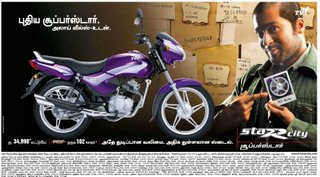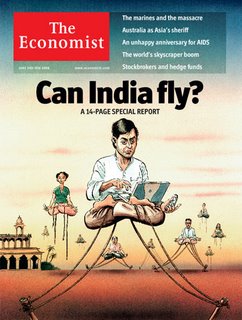Friday, June 30, 2006
Thursday, June 29, 2006
Himesh Reshammiya in Tamil
Wednesday, June 28, 2006
It's Derek from Delhi
Graeme Philpson of The Sydney Morning Herald spends some time in a Delhi call centre and gives us a snapshot what happens inside the call centre. The tone indicates that Australia and the rest of the world are more to such Indian call centres than ever before.
A new worker in a call centre, armed with a university degree, earns about $300 a month. A programmer will earn about $500. That may not sound like a lot but it goes much further in a country where a good haircut costs a dollar and a new car less than $10,000.
You and I might regard unsolicited telephone calls from India or elsewhere as a bit of pain. It's certainly an irritation but it's also a massive business employing hundreds of thousands of people.
There is much more to it than out-bound telemarketing. These call centres also handle airline reservations, insurance claims, help desks, political campaigning - you name it. And they are getting better at it.
The bottom line remains someone trying to sell you something but they are getting cleverer at doing it.
And they are not about to disappear from our lives any time soon.
Corporate Blogging in Indian MSM
Mumbai based DNA has three blogs Life, Technology and Politics. Since some of these are not frequently updated, they have failed to get noticed. Moneycontrol.com has a frequently updated Tech Blog, which tries to promote the tech shows on its group channels (CNBC TV18 and CNN-IBN). I doubt whether people will turn to Moneycontrol for a tech blog. Moneycontrol and CNBC India are strong brands in the business and finance space and they would be better off creating a finance related blog. D Murali, Deputy Editor of The Hindu Business Line has been putting up some of his MSM articles in various thematic blogs created for this purpose. Since these blogs just link / reproduce the original article, they might not find favour with the audience. Eventhough the Indian media houses have their own domain, some of them have chosen to take the Blogspot route to host their blogs.
Are you aware of any another popular blog in the Indian MSM?
Update: Business Standard feeds are up and running.
Friday, June 23, 2006
A Dress Code For Shattered Accountants
For chartered accountants, jeans and tees may no longer be in. The Institute of Chartered Accountants of India (ICAI) plans to specify a ‘dress code’ that would discourage casual dressing manners of CAs.
Broadly, what ICAI president TN Manoharan has in mind is full sleeve shirts, ties and shoes. The institute, which is also the regulator for the profession, would not, however, mind members in pajama kurta or dhoti kurta, since these are nationally-recognised.
The effort, it seems, is to jazz up the image of CAs and lend them a corporate look. The dress code, to be formally announced soon, will be optional initially.
Luckily, the institute has clarified that this rule will apply only to business meetings. If the ICAI wants to do micro-policing, they could even go ahead and suggest a uniform for the members.
It is better that the ICAI lets the members decide on their own attire as the professional would be the right person to decide on the right attire for a particular business event.
Sivaji - The Leaks Continue
 (via) If you look at the entire photo set carefully, they don't look like latest snaps. They seem to be the ones which were shot during the launch of the movie.
(via) If you look at the entire photo set carefully, they don't look like latest snaps. They seem to be the ones which were shot during the launch of the movie.Top Billing For Superstar
It is a well known fact that Superstar is among the highest paid film stars in India. About six months ago, there was a report on remuneration of various film stars and it was mentioned that Rajini was the highest paid Indian film star and he ranked second in the whole of Asia (behind Jackie Chan). CNN-IBN has dug up the same article and presented it with some disputable facts.
Rajnikanth's last release Chandramukhi reportedly grossed over Rs 70 crore in 2006 - this with a mere regional audience and without an NRI following like Bollywood movies have.
Rajnikaanth is the highest paid actor in Asia after Jackie Chan. While Chan might earn 68-70 Crores (in rupees), Rajni officiaally (sic) earned 14 crores for Chandramuki officially. He also gets a percentage of collection.
Hindi movies do enjoy a good following globally, but Tamil movies also have a reasonably large global viewerbase. You can easily come up with a list of atleast 10 countries (small and big) where Rajini movies get released. Unconfirmed reports put Rajini’s share of the Chandramukhi collection at 50%. He could have earned about Rs. 25 – 30 crores as his share from the distributor profits. This is in addition to his pay of Rs. 15 Crores. So, Rajini could have made about Rs. 40 crores from Chandramukhi.
Tuesday, June 20, 2006
Krrish Gets Boinged......
 I think the STB really needs to think about the kind of projects they want to associate themselves with. Viewers of Sun TV would have noticed that the recent episodes of the mega-serial Selvi was filmed in S'pore. I don't think the Tourism Board would have got enough mileage by using a mega-serial like Selvi. Selvi also contained major flaws that the STB could have tried to avoid if they had vetted the entire filming and given inputs to Radhika & Co.
I think the STB really needs to think about the kind of projects they want to associate themselves with. Viewers of Sun TV would have noticed that the recent episodes of the mega-serial Selvi was filmed in S'pore. I don't think the Tourism Board would have got enough mileage by using a mega-serial like Selvi. Selvi also contained major flaws that the STB could have tried to avoid if they had vetted the entire filming and given inputs to Radhika & Co. The Key To Upward Mobility
 Ask anyone who has changed mobile handsets (from one brand to another) recently and he/she will tell you that the transition has been less than smooth. One of the problems is the functionality of the various keys. Unlike a (QWERTY) computer keyboard, where most of the keys (especially the space bars, alphabets and the numbers) are standardized, handset manufacturers have not done much to arrive at some sort of common denominator for the keypad. The first issue people notice is the placement of the space bars, special character keys. People who are adept at messaging at razor speed would find their speed considerably reduced as they try to get acclimatized to the new handset. Even basic functions like screen lock / keypad lock seems to be differ from handset to handset. A standardized keypad should be a big boon to consumers migrating from one handset to the other. Are the handset manufacturers listening?
Ask anyone who has changed mobile handsets (from one brand to another) recently and he/she will tell you that the transition has been less than smooth. One of the problems is the functionality of the various keys. Unlike a (QWERTY) computer keyboard, where most of the keys (especially the space bars, alphabets and the numbers) are standardized, handset manufacturers have not done much to arrive at some sort of common denominator for the keypad. The first issue people notice is the placement of the space bars, special character keys. People who are adept at messaging at razor speed would find their speed considerably reduced as they try to get acclimatized to the new handset. Even basic functions like screen lock / keypad lock seems to be differ from handset to handset. A standardized keypad should be a big boon to consumers migrating from one handset to the other. Are the handset manufacturers listening? Mix and Match
Monday, June 19, 2006
Evolution of Tamil Film Music
(1976)-Today, no other artiste personifies the popularity of film music as does Ilayaraja. He entered Tamil films in the mid-1970s, when there was stagnation in film music. Ilayaraja's creations came as a whiff of fresh air. The song that made him famous in his debut film Annakili Annakili unnai theduthu (Annam is looking for you)-was authentic folk. In his 30 years in cinema, he has composed music for more than 1,000 films in Tamil and four other languages.
Even as Ilayaraja was dominating the scene, A.R. Rahman made his debut with the film Roja (1993) and went on to introduce world sounds and New Age music to our film score. Rahman's stress has been more on songs than on background score. Unlike Ilayaraja, he accentuates the independent aural character of film songs; they aren't necessarily linked to the onscreen images or the characters singing them.
Friends Again
 During the recent TN elections, there was a remark that Amma was not keen on sharing the dias with her coalition partners and that indicated that there was some friction between the alliance partners. Amma has realized this a bit too late and made up for it last week when she 'joined hands' with Vaiko and Thiruma during the agitation for the fuel price hike:
During the recent TN elections, there was a remark that Amma was not keen on sharing the dias with her coalition partners and that indicated that there was some friction between the alliance partners. Amma has realized this a bit too late and made up for it last week when she 'joined hands' with Vaiko and Thiruma during the agitation for the fuel price hike:Sunday, June 18, 2006
Friday, June 16, 2006
Trade Unions Teach You To Fall Sick
It is quite difficult to prove that someone is not really sick if they have one day off; and most sick policies provide for the employee to self certificate for the first day off. But if you have a few days off which happen to be match days your employer may will notice a pattern to your sickness which might be used as evidence that sickness is not really the issue.
Hyderabad Cops....
Kannagi from the eyes of an outsider
Kannagi proved that even a non-native with no money and no family in sight can fight City Hall and win her case — that is inspiring.
Thursday, June 15, 2006
Indian Music Sites Wake Up To Reality
Galatta.com and Raaga.com, two leading film-related sites have started offering legal download of Tamil film songs. Galatta.com plans to offer legal downloads in other South Indian languages as well.
According to Mr. Ramdas, music from Galatta.com is placed between the record labels and free downloads. Albums are priced between Rs.35 and Rs.100 an album, but the advantage of downloading instead of buying the CD "is that you can buy a single song to download, priced between Rs.12 and Rs.15 a song. The songs are available in MP3 and Real Player format."
The sites need some finetuning to do. Raaga has differential pricing for downloads from India and the rest of the world. Indian customers pay Rs. 12 per song whereas the rest will pay $0.99 per song. It is better if they fix a uniform global price as the entire web operates on such a phenomenon. This is how other music download sites and VoIP services operate. They don’t differentiate between people living in different countries. Further Raaga’s FAQ says that the songs can’t be transferred to popular personal music devices like iPODs. Raaga’s downloads can only be transferred to other players like Creative. One of the main reasons why people download music is to transfer it to their personal music device (mobile phone / MP3 player). If Raaga is going to promote only download to desktops, listeners would be better off streaming from Raaga's site rather than paying for a file which is going to lie in the desktop.
If these sites fine tune their strategy and offer superior quality audio, they might find favour with the audience. Till then, the Lankasris and Mohankumars of the world will continue to remain in the limelight.
Filbert has a related post here.
Wednesday, June 14, 2006
No Dearth Of India Stories
 TIME Asia has a special feature on India. The issue has a special photo series on Mumbai and Mangalore. Like other recent features, there is a separate piece on the growing divide between the rich and the poor.
TIME Asia has a special feature on India. The issue has a special photo series on Mumbai and Mangalore. Like other recent features, there is a separate piece on the growing divide between the rich and the poor.On the brighter side, Mumbai is painted as the “City of Dreams” as it continues to be home for people aspiring to make it big in business and Bollywood. Mayank points out that the article on Mumbai contains some inaccuracies relating to Vikram Seth’s A Suitable Boy. The story on outsourcing warns that global majors might be forced to think of other destinations due the steep rise in Indian salaries. On the business front, there is a piece on the transformation of the Tata group and their ambitious international foray. The more interesting articles are the ones about the manufacturing boom and the India – China comparison.
K-Series Talk Shows
Just like Ekta Kapoor’s K series serials, we have another parallel K series going on. I’m referring to the K series talk shows by the likes of Karan Johar and Karan Thapar. Both of them come across as artificial. Karan Thapar also believes that putting on an arrogant tone might be an easy way to win over the audience. It doesn’t work everytime. If you get time, do watch Karan Thapar’s 25-minute interview with FM P Chidambaram on the reservation debate. During the interview, PC repeatedly pointed out that Karan Thapar was quibbling. Here’s a funny bit from the interview:
Karan Thapar: This is not a tax matter. This is an issue that affects the future of people in India.
P Chidambaram: Everything affects the people of India.
Karan Thapar: Its an issue that has been challenged. When the government is asked what’s the basis on which you have announced 27 per cent reservation in higher education for the OBCs. It’s an amazing thing to say the government will answer in due course. The government needs to give an answer today.
P Chidambaram: I am sorry the government does not have to answer you in an interview.
Karan Thapar: Its not me its the people of India.
P Chidambaram: Government will answer in the proper forum in Parliament in the Supreme Court not in an interview conducted by you.
Karan Thapar: But you can’t tell the people of India today.
P Chidambaram: I have told you about the material. Shall I say it in Tamil for a change?
Karan Thapar: No don’t say it in Tamil.
Have (Strong) Hands, Will Carry (More)
This is the good news from the British Airways to its customers as the airlines announced that from early July passengers travelling on its flight across the globe can carry one standard-size bag and one briefcase as hand baggage on all flights without any weight restrictions.
This rule change by British Airways could work to the benefit of young travellers. BA should probably clarify whether senior citizens can take help from other passengers, as some of them might not be strong enough to lift overweight luggage. Knowing the general Indian tendency to carry more, it would be interesting to see how BA applies this rule to the India sector.
The Bangalore Boom And The Detroit Doom
Bangalore has also made an important mistake. By favoring the I.T. industry with measures that range from preferential tax treatment to outright land grabs it has created a town too dependent on a single industry. In that respect, it could learn a sobering lesson from Detroit’s sad decline.
Tuesday, June 13, 2006
NDTV's Southern Focus
The Prannoy Roy-promoted NDTV Ltd can now offer region specific programming with the introduction of opt-out telecast technology.
NDTV 24X7 today announced the launch of Southern Edition, a daily news programme for its viewers in Southern India. Starting 12 June, the viewers in the states of Tamil Nadu, Karnataka and Kerala will be able to watch region specific news and programmes. The southern specific telecast will be extended to Andhra Pradesh soon.
Opt-out telecast allows NDTV 24X7 to air Southern Edition while the rest of the country continues to watch the national telecast.
Southern Edition will air every weekday on NDTV 24x7 at 7:30 pm. On weekends, the channel will bring a bouquet of special programs for the viewers of these states, the statement says.
NDTV has lot of other issues to attend to. It’s website looks more like a public sector website. NDTV site comes across as a poor cousin to the CNN-IBN site.
Sunday, June 11, 2006
Outsourcing the CEO
China, India and other emerging markets offer shareholders a virtually unlimited talent pool from which to draw chief executives. With an increased supply of candidates, a truly independent corporate compensation committee would be easily able to hire superior leaders at salaries and benefits that are a small fraction of what their American counterparts in those fancy corner offices demand.
Also, given the importance placed on performing well in science and math in countries like China and India, it would be more likely that an offshored chief executive would have had a rigorous technical education instead of degrees in the "softer" management disciplines that are common at American business schools. Critics may question whether it is wise for an American company to have its chief executive in Bangalore or Beijing. But this is the thinking of a bygone era. More and more corporate chiefs say that they do not want their companies to be seen as American anymore. Cisco's chief executive, John Chambers, has declared, "What we're trying to do is outline an entire strategy of becoming a Chinese company."
MK’s Weakness For Kannagi
 Outlook spices up the news surrounding the re-installation of Kannagi State in Chennai:
Outlook spices up the news surrounding the re-installation of Kannagi State in Chennai:On his 83rd birthday, Tamil Nadu CM M. Karunanidhi ensured that Kannagi's statue was back at the Marina Beach. In December 2001, then CM J. Jayalalitha cited bad vaastu and got it removed. Karunanidhi was heart-broken. In Tamil literature, Kannagi, the heroine of the Sangam-era epic Silappadikaram, is known as the icon of chastity. While Karunanidhi would have us believe that with the statue, Tamil self-respect has been restored, he's got another quite romantic reason. The model for the statue was Kalpana, a 1960s actress-socialite, whom Karunanidhi fancied. In 1968, the C.N. Annadurai government installed 40 statues, of which Karunanidhi inaugurated only Kannagi's. But it is more the model (Kalpana) than the symbol (Kannagi) that gave Karunanidhi solace.
Friday, June 09, 2006
A New Addition To The Vegetarian Family
If the Madhya Pradesh Fisheries Minister has his way, vegetarians worldwide would have a new eating option. The Minister has said that prawns are very similar in nature to eggs and since eggs have been considered as vegetarian (??), prawns should also be given the same vegetarian status. (Hat-Tip: Eshwar)
Madhya Pradesh Fisheries Minister Moti Kashyap is facing an angry backlash from the state's Jain community for having claimed that prawns are vegetarian food.
In his eagerness to promote prawn culture in Madhya Pradesh, Kashyap has put forth arguments that haven't gone down too well with some.
"Like eggs, the protein content in prawns is very high. Both are covered in shells. Scientists consider eggs vegetarian. Therefore, I have labelled prawns as vegetarian too," he said.
Other similarities suggested by Kashyap are that eggs and prawns both solidify after being boiled, and like poultry eggs do not hatch, prawns too do not reproduce in fresh water.
Since the Minister’s convincing skills are pretty good, I strongly recommend that the Union Petroleum Ministry use his skills to justify the petro price hike.
Thursday, June 08, 2006
Chennai Says, ‘Hello, Moto’

Nokia (NOK1V.HE) controls nearly half the $2.5 billion Indian handset market and its suppliers are investing about $150 million in its Chennai unit, which makes a few million handsets a month.
This is probably the first major investment that has been announced after the DMK government took charge in the state. It is still not clear whether the state government has given some special concessions like subsidized land / tax subsidies to attract Motorola to TN.
Bachchan Jr. strikes a chord with TN based firms


Wednesday, June 07, 2006
‘Jithan’ Ramesh speaks in Englipis
Hilarious!
Thanks to Silverscreen for bringing this to our attention.
Car Pooling Is Here
On website commuters are able to post their own carpool ads in the carpool section or search for ads according to city, area and pin code thereby getting sharp and accurate results, all for free.
There is also a privacy option where users can hide personal information and manage responses to their carpool ads via the online mailbox itself, this is a useful feature for women who want a carpool but are hesitant of putting their contact information online.
Indimoto.com is offering free listing of car pool ads and might plan to charge for the ads at a later date. I guess Indimoto will try to build a community and then start charging for the ads. One of the main problems with car-pooling is the co-ordination element. It is generally easy in the mornings as the people who are part of a car pool might leave for work around the same time. However, each of the car pool members might wind up their work at different times and hence people end up using their own mode of transport in the evening.
BTW, the guys at Indimoto also have a not-so-publicized blog.
Raja Teams Up With RGV
Sounds interesting now, but we need to wait and see whether IR can recreate some of his old magic:
After seventeen long years, Ram Gopal Varma and music composer Ilaiyaraaja will be coming together for the director's forthcoming Shiva. Incidentally, the two had worked together on RGV's first film, also titled Shiva. The filmmaker is known to not pay any heed to market trends. So despite Ilaiyaraaja's last Hindi film Mumbai Xpress not being a big musical hit, RGV has still signed him on.
The Quest For The Ideal Indiblog Directory
Indian Bloggers seems to have caught the fancy of the Indian blogosphere as lots of bloggers have registered with it. The category wise listing also helps as some people might be looking for specific blogs on food, stocks etc. Inspite of sending multiple emails and feedback to Indian Bloggers, their team is not keen on cleaning up their site. Week after week, you see a music download site (IndiaFMS.com) being listed as the number 1 blog. I fail to understand how a music download site can be classified as a blog. Apart from this, you have some blogs, which reproduce videos and photos from other sites and post them on their blog. Lot of this is adult content. Blogs like Time Pass Videos, Must See Videos and Negar Khan Photos seem to be the most prominent ones. How can genuine blogs be featured alongside such blogs, which don’t carry any original content? These tasteless blogs have been started with the primary motive of earning Adsense revenue. If this trend continues, the blogs featuring pictures of Mallika Sherawat, Namitha and Negar Khan will rule supreme in Indian Bloggers directory. Genuine bloggers might even prefer to delist from these directories as none of us can stand up to the challenge of the filmi celebrity sites and MP3 download sites.
Tuesday, June 06, 2006
NRN on Infy’s Past and Future
Yale Global’s Nayan Chanda interviews N R Narayanamurthy for the Online edition of Yale Global. NRN talks about some of the initial roadblocks during the license raj. He also explains some of the current issues like the challenges in managing a massive global workforce and in managing diversity.
Chanda: The rapid growth of outsourcing is very good news for a country like India or China. But one sees an increasing concern in Europe and the US about white-collar jobs leaving the country and going outside. Do you see that this could be a drag on your business?
Murthy: You know my view is that people in glass houses should not throw stones at others. After all, what we are doing is what we were preached to do by the rest of the nations. My European friends, my American friends, told me umpteen times in the 1980s how India should become more and more open, how India should open up its borders, how India should reduce its tariffs, how India should allow competition from multinationals, etc. I agreed with all of them. All we’ve been doing is implementing the ideas that they have been propounding. So, at this point in time, just because the shoe pinches a little bit, I don’t think we should go back on those principles.
So my view is, at the end of that day is that we’re making corporations in the US, in Europe, in Japan, in other countries, more competitive, not just for selling in their own countries, but in other countries. So just as we accepted liberalization, just as we opened up our borders, I believe that western nations, too, would gain from such open access.
The above reply by NRN is very much similar to Tom Friedman's response to the anti-outsourcing lobby in The World is Flat.
Monday, June 05, 2006
The Hindu responds to a blog allegation
Few days I had linked to this post by Churumuri on DesiPundit. The piece talked about an apology issued by The Hindu with regard to an Open Page article about the Indian participation in an auto show in Germany. The blog post had questioned the motive behind The Hindu’s apology. The Readers’ Editor make a reference to this blog post in his weekly column and gives a detailed response.
The reader's query was a legitimate one and called for an answer. On a different plane were the insinuations and assumptions in a commentary by Arvind Swaminathan on churumuri.wordpress.com, the website run out of Mysore "by a bunch of talented, if somewhat obsessed Mysoreans," as Ramachandra Guha put it. For this was another opportunity to decry N. Ram, The Hindu's Editor-in-Chief. "Staffers in The Hindu," according to this commentary, were aghast at this surrender to corporate forces, represented by an automotive firm (factually inaccurate), with advertising clout. With glee, it pointed out that the Editor had not included any reference to the date of publication of the article in question, missing the fact that the date was in the preceding item to which the apology was tagged.
Even more amusing was the query whether before publishing the apology, Mr. Ram had consulted K. Narayanan, the Readers' Editor, "whom he touts as the panacea of [sic] all journalistic ills in the country." Why his "sources" in The Hindu, whom he cites again and again, did not give this information to him is a matter for conjecture. The barb aimed at me shows lack of understanding.
I don’t know how Churumuri is going to react to the above response. This elaborate response shows that The Hindu is interested in responding to some of the criticisms made by the blogosphere. This kind of response will probably prompt more people to come out in the open. Will The Hindu also care to explain why they refused to carry Sevanti Ninan’s column on Sun TV?
Update: Churumuri has a ten point response. It would be interesting to see whether The Hindu takes this debate further and responds to some of the questions posed by Arvind Swaminathan of Churumuri.
A Fine Blog
When it comes to writing articles about blog libel, ToI and ET lead the pack.
Irate college kids are blissfully venting their frustration against professors, toppers and even celebrities in a language mothers would not approve of. Corporates are hiring bloggers to abuse their rivals, in a professional fashion. They name people and indulge in online character assassination. One such paid blogger hurled a series of unmentionables in Hindi against a rival.
The option to remain anonymous only helps their cause. Recently, a man who had just started blogging found that someone else had been making unparliamentary comments on him on the blog and, strangely, in his name.
If the blogger makes a defamatory statement, both the website hosting the blog and the blogger can be held responsible. In case of obscene language or images, the blogger can be imprisoned for five years and fined Rs 1 lakh. Second conviction would double the penalty.
Also, if the blog is hosted by a server outside the country like blog.com, blogspot.com and blogger.com, there is a clause in the IT Act. It states that if any person committing an offence is stationed outside India, but the effects are felt in the country, he can be held. But implementation, say experts, becomes difficult due to geographical reasons.
The article doesn’t give any reference to the defamation and slander charges and hence we are not in a position to decide whether they are real or cooked up. This is very much consistent with past ToI & ET articles on blogging.
Sunday, June 04, 2006
Apple Calls Off Indian Call Centre Operation
An ITWire article goes on to say that Apple customers expected that service levels would drop as a result of this move to India. Although people had started voicing concerns, none of them had experienced the new service levels, as the new set-up had not gone live. If Apple had expected such a reaction, they should have not gone ahead with the setting up of this operation.
Apple's Mac and iPod users envisioned poor experiences as a result of the outsourcing of its support centre. They had taken to expressing through blogs, their strong disapproval and disillusionment with the company they felt they all owned because Mac and iPod users constitute a world of their own with a deeply embedded streak of loyalty.
Given the Western media’s penchant for such headlines, one can expect this piece of news to be splashed across all the western media.
Cute Boys & NUS Business School
Friday, June 02, 2006
Can India Fly?
 The above caption sounds very much like a campaign by somebody who doesn’t like Air Deccan, but it happens to be the theme of a special survey published in the latest issue of The Economist. Since The Economist is a paid site, you either need to get hold of the print edition or have a valid login to access most of the articles.
The above caption sounds very much like a campaign by somebody who doesn’t like Air Deccan, but it happens to be the theme of a special survey published in the latest issue of The Economist. Since The Economist is a paid site, you either need to get hold of the print edition or have a valid login to access most of the articles.All the same, signs of a boom are everywhere. Some 5m new mobile-phone connections are added each month. To meet the soaring demand, Nokia, the Finnish handset giant, last year built a huge factory near Chennai in just five months. Almost every city is seeing frenetic construction. Some 450 shopping malls are being built.
Flights are full, and prices of hotel rooms ruinous. Judging by the lodging allowances set by America's State Department, a room in India's information-technology capital Bangalore now costs $299 a night, as much as anywhere in the world. Industry's costs, too, are soaring: Lakshmi Narayanan, boss of Cognizant, an IT-services firm, says the price of land next to one of his facilities in Chennai, needed for expansion, has risen by 180% in 12 months.
Simon Long, South Asia Bureau Chief of The Economist outlines some of the challenges in this article and the related audio interview.
Thursday, June 01, 2006
Blog Search Goes Local
No global blog search tools are yet able to distinguish between blogs from different regions, a situation that is exacerbated by the growing assortment of blog hosts and the fact that many Australian bloggers use .com addresses for their blogs.
The search engine also has the facility to search for blogs globally, as well as scanning local news sources. Results are based on how recently a blog was posted along with a popularity measure examining the traffic and number of links to a blog.
The success of such efforts could very well create buzz in this space. We already have more than five Indian blog directories with some of them syndicating the content and others providing ranking based on number of hits / links. One of these directories would be well placed to expand into the local blog search space, as they would have already built a database of active Indian blogs.
States Act Stupid
Following the footsteps of Nagaland and Punjab, Tamilnadu has decided to ban the screening of Da Vinci Code. Unlike most other parts of the country, The Da Vinci Code was supposed to be released in TN on 2nd June. When the Central government itself has decided against imposing a ban on the movie, why are the state governments trying to prove that they also have some decision-making power?
TN and Punjab are ruled by DMK and Congress respectively. These two parties are part of the UPA government, which is in power at the Centre. If these parties really want to support the cause of the minorities, what have these state units done when the I&B Ministry came out with a decision? These bans hardly work as people can anyway go to the neighbouring state to watch the movie or wait till they get hold of a pirated copy. Ultimately, theatre owners and distributors could be on the losing side.
"The Government has taken cognizance of the various reports and complaints received from the minority communities, particularly Christian community regarding the proposed screening of the movie," the Principal Secretary, Home, said in a press release.
The screening of the movie might hurt the religious feelings and sentiments of the Christian community and lead to demonstrations and disturb peace and tranquillity within the State, the release added.
The movie has been running in several other states for the last 5 days and no major concerns have been raised. Even if the minorities are offended, why can’t the state authorities make an attempt to hear their views and release the movie after making cuts or disclaimers suggested by the minorities?







